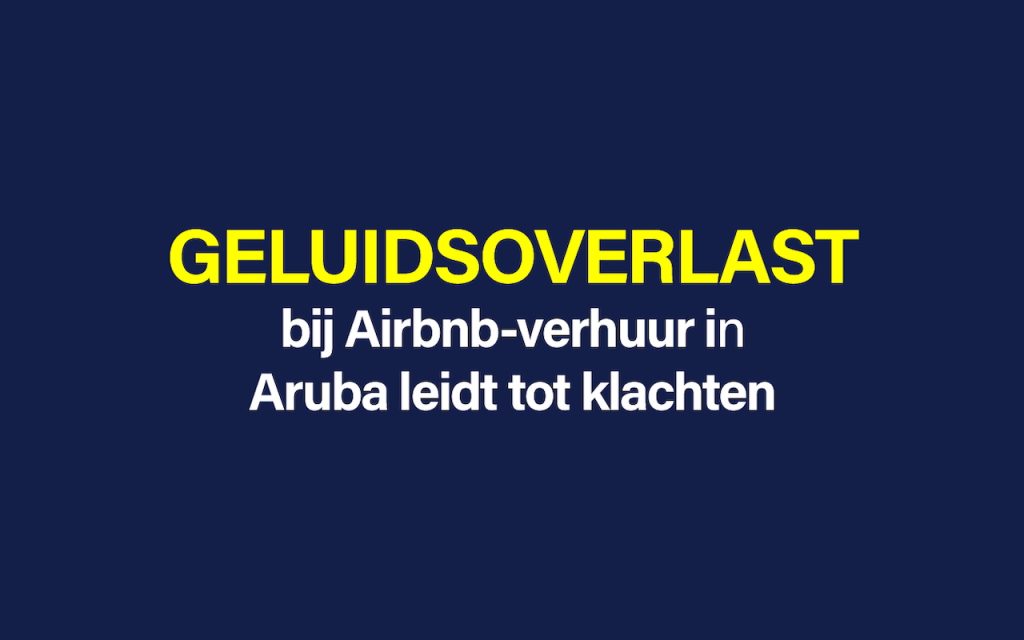
ORANJESTAD - The number of complaints about noise pollution from Airbnb rentals in Aruba is on the rise. Tourists staying in private rental properties on the island regularly report serious nuisance from loud neighbors or partying guests in surrounding homes. This problem raises concerns not only for visitors, but also for the local community, which feels increasing pressure on residential neighborhoods.
With the growth of private rental properties through platforms such as Airbnb, noise pollution is increasingly being cited as a negative experience. Vacationers and residents alike complain about loud music, nightly parties and other noise pollution that often crosses the line of what is acceptable. Recent figures show that Aruba will have as much as 3,839 active Airbnb locations had, with a median occupancy rate of 74% and an average daily rate of $146.
The impact on the community
The increase of tourism in residential areas brings benefits such as economic growth and job creation. But there are downsides, too. Local residents report that their residential enjoyment is increasingly disturbed by noisy vacationers. Some residents feel compelled to take legal action or report their complaints to the authorities.
"It's not just the music," says a resident of North, one of the most touristy areas on the island. "It's about constant nuisance - cars coming and going late at night, loud conversations and even garbage not being disposed of properly."
Laws and regulations surrounding noise pollution
Noise pollution in Aruba is regulated by the Nuisance Noise Ordinance, part of the public order regulations under article 05.10. This law sets limits on what is acceptable in terms of noise production in residential areas and provides tools for enforcement in cases of nuisance.
Article 05.10 - Noise (summary):
- It is forbidden to produce annoying noises that pose a risk to the peace or health of others.
- Excessive noise pollution, such as loud music or party noise at night, falls under the enforcement measures of this law.
- Local authorities can impose fines or sanctions on violators.
In addition, specific guidelines have been established in the "Guideline nuisance noise standards for music events" of the Directorate of Public Health Aruba. These guidelines include:
- Event noise levels:
- Carnival activities: Maximum 90 dB(A) measured at 10 meters from the noise source.
- Outdoor concerts: Maximum 90 dB(A) from the front row of the audience.
- Enclosed spaces: Maximum 90 dB(A) LAeq,15min, with a peak level of 93 dB(A).
- Free provision of earplugs that attenuate up to 30 dB during music events.
- Specific placement and guidelines for sound systems to optimize sound dispersion and prevent hearing damage.
Also, the Dutch Civil Code provides inspiration for regulations. Article 5:37 states that owners may not cause a nuisance through noise or other forms of nuisance beyond reasonableness and fairness. Local regulations, as contained in the General Municipal Regulations (APVs), provide additional guidance for specific situations. Although the situation in the Netherlands is different, similar principles can be applied to better regulate nuisances in Aruba.
Enforcement and support
It is important for owners of private rental properties to be aware of their responsibilities. The noise pollution policy introduced by the Aruban government provides clear guidelines and penalties. But enforcement remains a challenge, especially in tourist areas where it can be difficult to address violations directly.
Tools are available for residents and property owners affected by noise pollution. Professional noise measurements can help objectively determine whether noise levels exceed legal standards. These measurements can be used as evidence in reports or legal proceedings.
In addition, neighborhood organizations and mediators can help resolve conflicts. Encouraging awareness among both landlords and guests is crucial to reducing nuisances.
Finding a balance
Aruba is a paradise for tourists, but it must also remain a livable place for locals. Finding a balance between tourism and livability is essential. With the right measures and cooperation, we can create a situation where both visitors and residents of Aruba can enjoy themselves without hindrance.
Need help measuring noise or want more information about noise policies in Aruba? Contact us, and we are ready to help. Together, we will ensure a better balance between tourism and a pleasant living environment.

